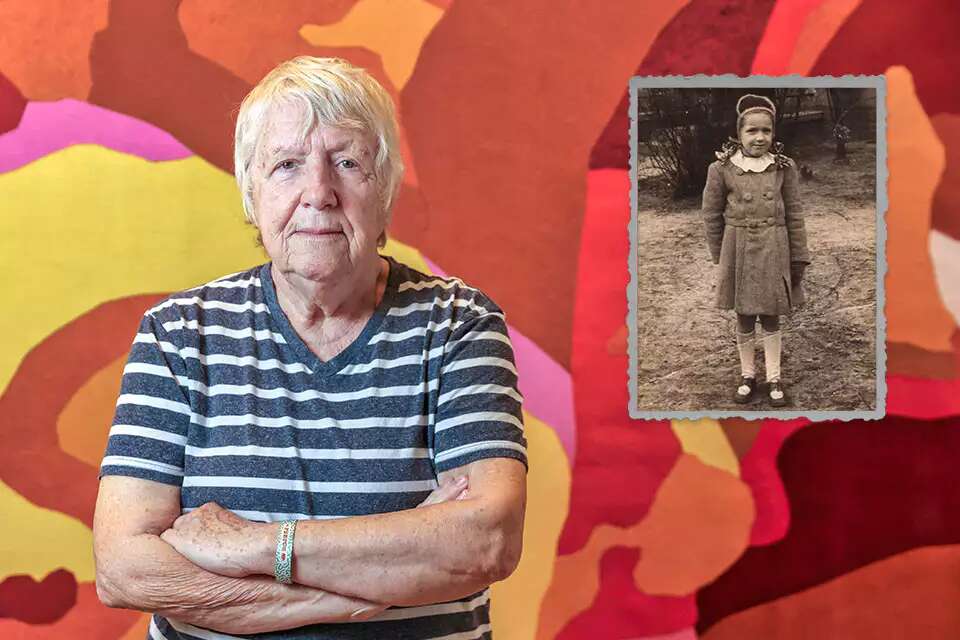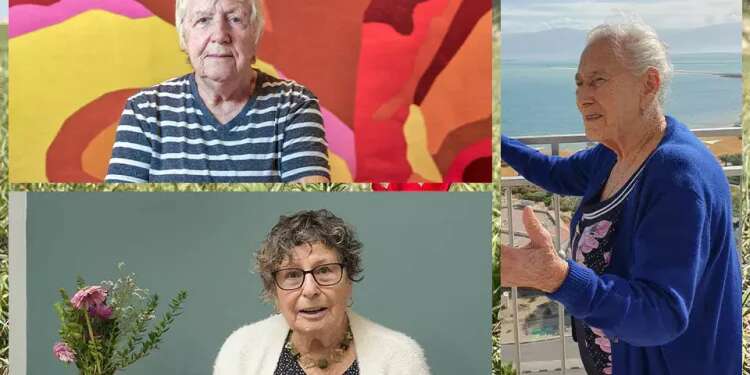On the eve of Oct. 7, 869 Holocaust survivors and survivors and victims of antisemitic acts lived in the Gaza periphery and 1,118 in northern Israel.
Follow Israel Hayom on Facebook, Twitter, and Instagram
Various parties, including the Welfare and Social Affairs Ministry, the Holocaust Survivors' Rights Authority, The Foundation for the Benefit of Holocaust Victims, and the Claims Conference, held proactive talks and meetings in the places where the survivors were evacuated and assisted them with food, clothing, and other necessities.
The Claims Conference awarded a one-time grant of approximately 1,200 euros [$1,300] to each Holocaust survivor who was evacuated from his or her home in the wake of the brutal Hamas attack and allocated an emergency 30 million shekel [$8 million] budget for the cause.
According to data collected by the Holocaust Survivors' Rights Authority, at the beginning of the IDF ground operation, 93 Holocaust survivors chose not to evacuate the Gaza periphery. Most of those who stayed behind were left without support from family or a supply of essentials.
According to the Welfare and Social Affairs Ministry's Ruth Meitlis, "For Holocaust survivors, dealing with the events of the war can be difficult and evoke memories of the past. Being evacuated from their homes after Oct. 7 involves a struggle, on top of the already existing challenges of old age.
Nevertheless, "studies show that Holocaust survivors tend to demonstrate resilience. It can be seen even today that despite the hardships they went through, Holocaust survivors over the years demonstrate resilience, which is an example of the ability to rise from a crisis."

Raisa Matato, 88, from Sderot, a Holocaust survivor from Dagestan, evacuated to the Dead Sea
Raisa lives in Sderot, opposite the police station that was taken over by terrorists on Oct. 7. For over a day, she was locked in her house, without water, electricity, or the ability to reach others. She heard the shots and the heavy fighting but did not understand at the time the magnitude of the event. Now, staying at a Dead Sea hotel, she already understands what occurred on that dark day, and fears that the terrorists will return to Sderot.
The difficult events left their mark on Raisa and took her back to the time of World War II. Every time she hears about a fallen soldier – she cries. When she heard last week about the deadly incident in which 21 soldiers were killed, she had difficulty speaking. In her innocence, she suggests that the state take her pension and give it to the soldiers so that it does not get to deficit spending.
Raisa was born in the city of Derbent in Dagestan, a republic in southern Russia. When she was six years old, WWII broke out, and her father was drafted into the Red Army. Her mother was left to take care of five children alone. During the war, Raisa's father was captured and held in a concentration camp, and he only returned home in 1948. She remembers that all the city's resources, factories, food, and equipment, were used for the needs of the war. As a little girl, she was forced to dig ditches. Occasionally, when there was a rumor that the Nazis were approaching, they hid.
She remembers the hunger and how her mother gathered wheat grains, ground them into flour, and made some bread for the children.
"We were hungry all the time," Raisa said. To this day, her refrigerator is always full, because she is afraid that she will not have anything to eat. At the age of 18, she got married and moved to live with her husband in a city near the border with Ukraine. In 1999, they immigrated to Israel with their four children and immediately moved to live in Sderot, across from the police station.
"I remember the morning [of Oct.7], when the attack began. I was alone at home and I was very scared. I heard the shots and did not understand what was happening. My daughter called me and explained to me that it was forbidden to leave the house and that I should sit in an inner room and not go near the windows. Then there was no more electricity. The whole time I was afraid that the terrorists would enter my home. I went back to my childhood, to the time of the war, and I did not understand how this could happen to us here. To this day, I do not understand how this happened to us. I am very afraid."
Even at the Dead Sea, in the safe place where Raisa is now, she is afraid that terrorists will come. When she was told she had to evacuate, she only took a small bag with her. She felt very lonely and feared that she would lose not only her home but the whole country. "I thought it was a war that Israel would never get out of, that it would be like World War II, and that they would take over the country," she shared.

Yehudit Tzamir, 88, from Kibbutz Mefalsim, a Holocaust survivor from Germany, evacuated to a hotel in Herzliya
Kibbutz Maplisim is located near the Gaza Strip. On Oct. 7, the members of the kibbutz's civilian security team, under the direction of the military security coordinator and with the help of four soldiers who were in the kibbutz that Saturday, managed to stop the infiltration of dozens of terrorists into the community and prevent a massacre.
"We never imagined that the army would not be there, that we would be left to fight alone for our home," Yehudit said.
That Shabbat, she and her husband were in the north, but her son, daughter, and grandchildren were in the kibbutz and locked themselves in their home for many hours. The members of the kibbutz were eventually evacuated to Herzliya.
"The next day we returned to the kibbutz to pick up equipment. The road was littered with burnt cars. I will never forget what I saw."
Yehudit was born in Berlin in 1943, to parents who met while serving together in the German army. When her mother became pregnant they looked for a place where she could give birth. When the bombings increased, she was given to family members who lived in the German capital, who raised her as if she were their own.
"I have fragments of memories from that time," Yehudit says sadly. When she was four and a half years old, her mother appeared and took her back, but when her mother got married, Yehudit once again moved, this time to live with her favorite teacher.
She later received a prestigious scholarship to university and began to study psychology, and at the age of 20, immigrated to Israel. "I got to Mefalsim, met my husband, Carlos - and that's where I stayed. I chose my personal happiness."
Then came Oct. 7.
"I have trouble sleeping, I have to maintain my routine. I'm afraid that if we return, I won't have my routine. Today there is a military camp in the kibbutz. They are pressuring us to return because staying here costs the state a lot of money, but what will happen when the army leaves the kibbutz? It's dangerous. It is true that there were rockets before, but we were idiots to believe that it was okay to live like that. This is not life. What happened in Kfar Azza, Be'eri, Nir Oz did not happen to us, but on the other hand – the state abandoned us too, abandoned us."
Yehudit insists on not calling Oct. 7 a "Holocaust."
"The Holocaust was terrible. They wanted to hurt us because we were foreigners in their eyes. Now, the ideology behind it [Oct. 7] is different, that of religious extremism. And that is no less serious. It is the worst disaster in Israeli history."

Rivka Rachevsky, 88, from Kibbutz Sasa, a Holocaust survivor from Holland, evacuated to the Kinneret
Rivka was born in the city of Utrecht in the Netherlands. "I had a normal childhood. We lived in a mixed neighborhood. My father was a physicist and my mother was a housewife. Three years after I was born, my second sister was born. When the war broke out, we carried on as usual, but then all the restrictions began. I remember they took my bicycle. As a child, I did not understand that well what was happening, but I took the fact that they took my bike very hard because I used it to visit my friends."
Rivka knows a lot of the details of life at the time from a diary her father wrote during the war, which she inherited after his death. It is from the diary that she learned what the family went through and how they felt. For example, she read about the day she stood in line with her father and sister to get a yellow patch. At the time, Rivka did not understand the meaning of what was happening.
"We saw everything in a very childlike and innocent way. The adults spared us things and talked to each other. But my father felt terrible when he had to walk around with the yellow patch."
Eventually, the family was expelled from their home and moved to the ghetto in Amsterdam. Rivka continued to go to a Jewish school, until the spring of 1943 when the shipment of Jews to concentration camps increased, and the parents decided to go into hiding. Rivka was given a Dutch name and given to a Christian family who hid her.
"The house was dark, and I wasn't allowed to go out into the front yard so that I wouldn't be discovered. I didn't go to school, I didn't do anything." Every so often she was transferred to another family. In her estimation, she was in at least seven places. She wrote letters to her parents, who were hiding with their little daughter in a village in the north of Holland.
"I wrote to them that everything is fine and that I feel good, but between the lines, you can see how much I missed them."
During the war, her mother gave birth to a baby, who died two months later. When the war ended, in 1945, she had already lived with the last family for about a year.
"I became very attached to them. I went to church with them and really connected to Christianity. One day my father appeared and took me home. I remember not wanting to leave this family. I no longer knew my family."
In November 1947, the family immigrated to Israel. Rivka was 12 years old at the time. "There was a big celebration in the streets at that time," she recalled. At first, the family lived in Ramat Gan, but later moved to the north, when her father got a position at the Technion - Israel Institute of Technology. She says that integration in Israel was difficult. In addition to the trauma from the war, it was forbidden to talk about the Holocaust: "We had to be full-on Israelis. I was very dim and withdrawn, and it took me many years to recover."
Rivka moved to Kibbutz Sasa in the north after her military service, where she met her husband. She lived in Sasa for 66 years, and everything changed on October 7.
"I never imagined there would be such a catastrophe. Who would have thought?". Two days after the war broke out, they were evacuated and eventually made their way to the Kineret.
They have been staying there ever since. "We don't talk about going back. It seems so far away, and every day it gets further and further away. Although I live in a beautiful resort village, and we have activities, this is not my home. When I was a child, it was difficult for me to overcome the trauma of the war and immigration. It took me half a generation to overcome. Now we are refugees again."
She does not agree with those who say Oct. 7 was similar to the Holocaust.
"It cannot be compared. I hope that we will learn from what happened to us, and that we will be patient and love each other, even if our opinions differ. I expect our political and military leadership to draw the conclusions. A terrible mistake was made here."
Subscribe to Israel Hayom's daily newsletter and never miss our top stories!




